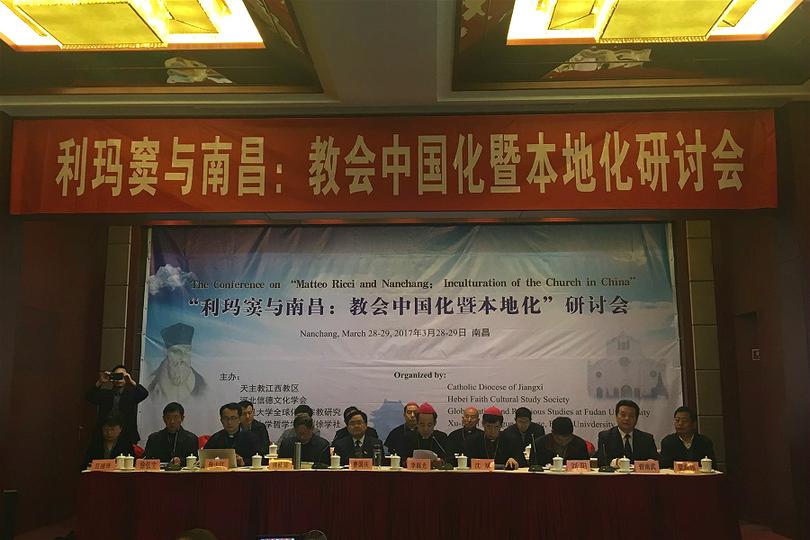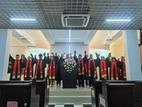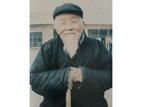On March 28 and 29, 2017, a conference themed "Matteo Ricci and Nanchang: Church Localization in China" (or Inculturation of Christianity) was jointly held in Nanchang by the Catholic Diocese of Jiangxi, Faith Institute for Cultural Studies in Hebei and the Xu-Ricci Dialogue Institute at the Fudan University's School of Philosophy and Research on Globalization and Religions in Fudan University.
At the opening ceremony, the Association of the CPCA and BCCCC'S standing vice-president, Bishop Shen Bin made a speech and spoke highly of Matteo Ricci's determination and dedication to spreading the Gospel in China until his death centuries ago. Meanwhile, Bishop Shenbin talked about the three lessons the respected foreign missionary's left to boost the efforts in localizing the Chinese church.
The following is a summary of his speech.
In 1583, courageously responding to the call of God, Matteo Ricci set his feet on mainland China for the first time under the leadership of Michele Ruggieri. As a new Jesuit missionary and even though he could not see the way ahead of him, Ricci gave himself a clear direction. He made the determination not to think about returning to Italy whatsoever, promising to dedicate his life to spreading the Gospel in China till he died.
Living in China for more than half of his lifetime, Matteo Ricci proved that the true kingdom he belonged to was the place where God had called him.
12 years later, in 1595, Matteo Ricci took a big step forward when he arrived in Nanchang, which he described as "one of China's most beautiful and distinguished cities." At this time, he not only looked like a Chinese scholar according to his dress style; but, also had the knowledge and accomplishment of ranking officials and intelligent scholars according to his words and behavior. In the same year, he published a book on how to make friends, which attracted many people to read the book. In his eyes, Nanchang was a beautiful place and has produced many important officials and influential scholars. When he was there, Matteo Ricci not only introduced to the Chinese people Western human science, he also helped them understand the Western rational spirit. With the help of the King of Jian'an, he printed a map of the world with China at the center impressing many. He also made Christianity at harmony with Chinese cultural traditions by using Confucian ideas. In Nanchang, he made a good impression on many scholars and officials with his rich knowledge and good behavior. Actually, many became proud to have the chance to come to know him. Until then though, he looked like a foreigner, but Matteo Ricci had become a local Chinese scholar in the eyes of everyone. He understood deeply the traditional Chinese classics and spoke fluent Chinese in addition to his knowledge about the world.
Three years later, in order to start a new evangelistic journey, Matteo Ricci left Nanchang and went to Beijing. Today, at the 420th anniversary of his departure from Nanchang, it is meaningful for us gathering here today to remember this Saint for China, along with the other forerunners of the Gospel's footsteps in Nanchang. We should not forget his first heart to spread the Gospel in China, and to explore the ways of the church to grow while keeping with the changes in Chinese society. We are faced with several tasks as follows: How can we make a new start from Matteo's first heart? How should we view his methods of adapting the Gospel to China? How should we to localize the Catholic Church in China?
To make a new start from his route, I think we need to reflect on three of his characteristics.
First of all, Matteo Ricci had a strong political sensitivity.
According to his own writings, Matteo truly appreciated China's political system from the heart since the beginning. He believed that the governing mechanism led by intellectuals in comparison to that led by generals was very close to the ideal state in Plato's mind, superior to the European political system. He respected the authority of local officials, liked making friends with them and talking with them in depth so he gained many friends from the circle of officials. What he did not only won him the favor of warlords, like the king of Jian'an, but also the high-ranking official working in the central court; Xu Guangqi.
Matteo Ricci often told the rulers that in order to bless the country and pray for the emperor, he had come to China. What he did arouse some controversies in his time and in following missions among succeeding missionaries. But he did not leave his mission to preach the Gospel as some thought. In his eyes, it was necessary that rulers come to know and understand the truth of the Gospel first so that they may support missionaries' work in spreading the Gospel in China. Although the church should not and can not use any political forces - both foreign and local- to spread the Gospel, this does not mean that the targeted country's national conditions and political conditions should be ignored by missionaries. On the contrary, it is more powerful to preach the Gospel to people in its own spirit. To this day, Matteo Ricci's practice in spreading the Gospel in Nanchang still give us important lesson.
Secondly, Matteo Ricci has a high cultural consciousness.
In traditional Chinese consciousness, it is not religion which is dominant; but culture or education. When examining the various lifestyles of the Chinese people, Matteo Ricci liked to look at them with a cultural perspective, rather than a religious perspective which missionaries involved in the ritual dispute tend to use in viewing people's life.
Since he arrived in Nanchang, he lived as a scholar first, writing books to explain Catholicism according to Chinese classical teachings. He wrote that it was improper for missionaries to build up churches in Nanchang, a culturally rich place as soon as they came to it. Instead, they should make efforts to build schools first. Despite the importance of setting up churches as the holy place for prayer and worship service, his suggestion that missionaries to China should emphasize the educational function of church combining the mission of the church with the educational cause to spread the gospel was profound and insightful. It was also the responsibility he took on his own shoulders as one of the famous European scholars after the Renaissance. If his suggestion had been studied and implemented by his successors, the status and position of Catholicism in China may have been comparable to that of Buddhism or Taoism, having made great contribution to Chinese culture. We believe that the localization of Catholicism does not mean simply building up some churches and create some holy music with Chinese cultural elements. Rather, it means that Catholicism keeps increasing its awareness of Chinese culture in order to be accepted by it through relevant teachings.
Third, Matteo Ricci has a deep moral cultivation.
It was not only his rich knowledge but also his high morals which attracted Chinese. Once he was robbed in Saozhou, but when the officer was about to give a severe sentence to the criminal, he pleaded with the judge for him to release the criminal, surprising many people at that time.
In Nanchang, people were also astonished to find that Matteo Ricci would not lie nor had he held the intention to lie. Regarding this matter, he wrote in his letter to the President of the Roman Jesuit that the foundation of the church was due to the people's trust in the missionaries' word. After people know that missionaries would not lie, they would be likely to believe in the truth taught by the church. Though the truth of the church is aimed at saving, benefiting people and teaching them to live a holy life, if the preacher's heart is not pure, people would doubt his preaching. Since China has always been well-known for its rites and etiquette, the church has the responsibility of inheriting the tradition and enhancing it. Moreover, because of the Gospel, the church should have a higher spiritual pursuit and moral standard than others, living as the salt and light for the world. Today, China needs the church to make such an example for people to learn from.
Localization is not only a theoretical issue, it is a practical problem. Matteo Ricci's experience in China's mission and his footprints in Nanchang is a valuable historical experience for the Chinese Catholic Church to learn from today.
Translated by Alvin Zhou











